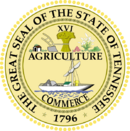Help us improve in just 2 minutes—share your thoughts in our reader survey.
Twenty-Third District Chancery Court, Tennessee: Difference between revisions
m (Text replacement - "Larry J. Wallace" to "Larry J. Wallace") |
(oos-elected local courts page script update) |
||
| Line 1: | Line 1: | ||
{{ | {{Local Courts Menu}} | ||
{{Localcourtsinfobox}} | |||
= | {{Local scope archive|Type=Court}} | ||
== | The '''23rd Judicial District Chancery Court''' resides in [[Tennessee]]. Click on the links below to learn more about the court's... | ||
* [[#Jurisdiction|Jurisdiction]] | |||
* [[#Selection method|Selection method]] | |||
==Jurisdiction== | |||
{{Local judicial jurisdiction|Court Name=Tennessee Chancery Court}} | |||
==Selection method== | |||
::''See also: [[Judicial selection in the states]]'' | |||
{{Local judicial selection|Court Name=Tennessee Chancery Court}} | |||
===Judicial elections in Tennessee=== | |||
::''See also: [[Tennessee judicial elections]]'' | |||
{{State judicial election types|State=Tennessee}} | |||
{{Tennessee local judicial election rules}} | |||
==See also== | ==See also== | ||
{{Seealsolocalcourts|State=Tennessee}} | |||
==External links== | ==External links== | ||
*[ | {{Google}} | ||
*[https://tncourts.gov/administration Tennessee courts] | |||
==Footnotes== | |||
{{reflist}} | |||
{{Tennessee courts}}<br> | |||
{{Tennessee}} | {{Tennessee}} | ||
[[ | [[Category:Local courts outside coverage scope]] | ||
[[ | [[Category:Tennessee]] | ||
Latest revision as of 17:46, 29 May 2025
| Local Courts |
|---|

|
| Trial courts and judges |
| Elections by state |
| Judicial selection by state |
| View courts by state: |
Ballotpedia provides comprehensive election coverage of the 100 largest cities in America by population as well as mayoral, city council, and district attorney election coverage in state capitals outside of the 100 largest cities. This page is outside of that coverage scope and does not receive scheduled updates.
The 23rd Judicial District Chancery Court resides in Tennessee. Click on the links below to learn more about the court's...
Jurisdiction
This court holds the following jurisdiction:[1]
| “ | Chancery Courts are courts of equity that are based on the English system in which the chancellor acted as the “King’s conscience.” A chancellor, the judge who presides over chancery courts, may modify the application of strict legal rules and adapt relief to the circumstances of individual cases. Chancery Courts handle a variety of issues including lawsuits, contract disputes, application for injunctions and name changes. A number of matters, such as divorces, adoptions, and workers’ compensation, can be heard in either chancery or circuit court.[2] | ” |
Selection method
- See also: Judicial selection in the states
Judges of the chancery court are elected in partisan elections. Each county may opt to hold nonpartisan elections instead. Judges serve eight-year terms, after which they must run for re-election if they wish to continue serving.[3][4]
The presiding judge of each court is elected to a one-year term by peer vote.[5]
Qualifications
To serve on the court, a judge must be:[3]
- authorized to practice law in state;
- a district resident for at least one year;
- a state resident five years; and
- at least 30 years old.
Judicial elections in Tennessee
- See also: Tennessee judicial elections
Tennessee is one of eight states that use partisan elections to initially select judges and then use retention elections to determine whether judges should remain on the bench. To read more about how states use judicial elections to select judges across the country, click here.
Primary election
Primary elections may be held for trial court judges. The political parties in each county determine whether or not there will be a primary election in their respective counties.
County primary elections
Counties that are having a primary election will have them on a Tuesday in May. The candidate who wins the county primary election in May will then move on to the county general election in August and run against other party candidates that won their respective primaries.[6]
Primary elections in Tennessee serve to designate a party's nomination and narrow the field down to one candidate from that party for a specific office. A candidate who wins their primary nomination will move on to the general election.[6] It is not uncommon for a candidate to run unopposed in their party primary and then go on to run unopposed in the general election as well. Similarly, candidates may win their primary and go on to run unopposed in the general election.
Voters do not need to declare their party affiliation when they register to vote. However, primary voters must declare whether or not they will be voting in the Democratic or Republican primary.[6]
See also
External links
Footnotes
- ↑ Tennessee State Courts, "About the Trial Courts," accessed May 22, 2023
- ↑ Note: This text is quoted verbatim from the original source. Any inconsistencies are attributable to the original source.
- ↑ 3.0 3.1 American Judicature Society, "Methods of Judicial Selection: Tennessee," archived September 11, 2014
- ↑ Justia - Tennessee Code, "16-15-202. Election Term," accessed November 20, 2014
- ↑ Tennessee State Courts, "Understanding Your Court System: A Guide to the Judicial Branch," accessed September 11, 2014
- ↑ 6.0 6.1 6.2 Hamilton County, Tennessee Election Commission: Differences Between Primary Elections & General Elections, accessed May 4, 2014
Federal courts:
Sixth Circuit Court of Appeals • U.S. District Court: Eastern District of Tennessee, Middle District of Tennessee, Western District of Tennessee • U.S. Bankruptcy Court: Eastern District of Tennessee, Middle District of Tennessee, Western District of Tennessee
State courts:
Tennessee Supreme Court • Tennessee Court of Appeals • Tennessee Court of Criminal Appeals • Tennessee Circuit Court • Tennessee Chancery Courts • Tennessee Criminal Court • Tennessee Probate Court • Tennessee General Sessions Court • Tennessee Juvenile Court • Tennessee Municipal Court
State resources:
Courts in Tennessee • Tennessee judicial elections • Judicial selection in Tennessee




